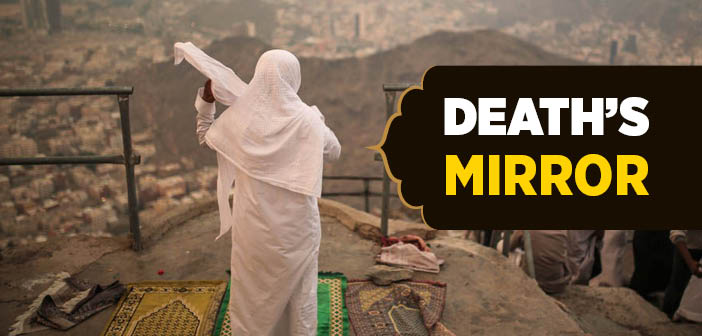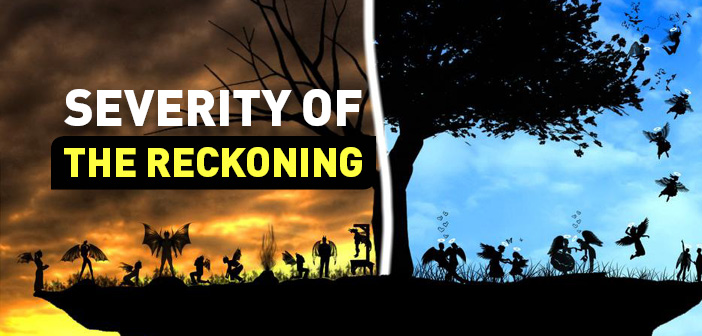What is the day of reckoning in islam? What happens on the day of reckoning?
The unbelievers, the evildoers and the heedless forever imagine in their fleeting lives a world that is without reckoning, responsibility and without an afterlife. When faced with the horrendous scenes of the Day of Resurrection, they will be willing to ransom themselves from the torment and punishment of that awesome Day, by everything they own and many times over for that matter. But alas, the chance would have been missed and the opportunity long lost. This scene is depicted in the Qur’an in the following way:
“Even though they can see each other. An evil doer will wish he can ransom himself from the punishment of that Day, by means of his sons, or his wife or brother or his family who sheltered him or everyone on the earth, if that only meant that he could save himself.” (Al-Ma’arij, 70:11-14)
The Messenger of Allah (may Allah bless him and grant him peace) said: in relation to the severity of the Divine Reckoning:
“The unbeliever will be brought on the Day and Rising and it will be said to him, ‘If you were to have enough gold to fill the earth, would you ransom yourself with it?’[1]
They will say, ‘Yes.’
They will be told, ‘You were asked for what is easier than that (not to associate anything with Allah, yet you refused).'” (Bukhari, Riqaq, 49; Muslim, Munafiqin, 52-53)
Another narration states that this question will be directed at “the person who has the least punishment in the Fire on the Day of Rising”.[2]
‘Adi ibn Hatim (may Allah be well pleased with him) relates that the Messenger of Allah (may Allah bless him and grant him peace) said, “Protect yourselves from the Fire.”
Then he turned and averted his face and then said, “Protect yourselves from the Fire.”
Then he turned and averted his face a third time until we thought that he was looking at it and then he said, “Protect yourselves from the Fire, even if only with half a date, or, if he cannot manage even that, then with a good word.” (Bukhari, Riqaq, 49)
The Messenger of Allah (may Allah bless him and grant him peace) states in a similar Prophetic narration:
“… [There is none of you but that] he will stand before Allah and there will be no veil, nor any interpreter to interpret for him, between him and Allah and He will say to him, ‘Did I not give you wealth?’
He will say, ‘Yes.’
Then Allah will say, ‘Did I not send a Messenger to you?’
And he will say, ‘Yes.’
Then he will look to his right and see nothing but the Fire and then to his left and see nothing but the Fire.
Each of you should protect himself from the Fire, even if only with half a date, or, if he cannot manage even that, then with a good word.” (Bukhari, Zakat, 9)
According to Islam, wealth and dominion belong to Allah. He demands from those slaves who are legally considered wealthy and thus subject to give the Prescribed Alms (the zakah) of one-fortieth of their wealth (over and above their basic needs). It is religiously binding upon every believer to determine this amount and donate it accordingly.
In addition, our Lord wants his slaves to give in charity and spend in His way. It is declared in a Qur’anic verse:
“You will never attain true goodness until you give of what you love. Whatever you give away, Allah knows it.” (Al ‘Imran, 3:92)
This is demonstrates that spending in His cause is one of the means bringing a person close to Allah.
The “half a date” mentioned is for a person who has nothing else to give. If a person with greater financial means distributes dates and supposes this to have relieved themselves of liability, they would have been greatly mistaken. Such an expression demonstrates that spending for the sake of Allah and in His way assumes a crucial role in protecting a person from the Fire and illustrates that it is an essential duty upon all people. Even if a person with nothing else than a single date is commanded to give away half of it, the sacrifice that those in possession of much greater material means can be better comprehended.
The Messenger of Allah (may Allah bless him and grant him peace) once said to one of the poorer Companions, Abu Dharr (may Allah be well pleased with him) “Abu Dharr, when you prepare broth, add water to it and share that with your neighbour.” (Muslim, Birr, 142)
When one of the Qur’anic verses commanding spending in Allah’s way was revealed, even the poor Companions took to the mountains to chop wood, bringing it back to sell at market and give away their earnings in the way of Allah.
Allah Almighty presents the following as a measure in this regard:
“Those who give in time of both ease and hardship, those who control their rage and pardon other people – Allah loves the good-doers.” (Al ‘Imran, 3:134)
“They ask you about alcoholic drinks and gambling. Say, ‘There is great wrong in both of them and also certain benefits for mankind. But the wrong in them is greater than the benefit.’ They ask you what they should give away. Say, ‘Whatever is surplus to your needs.’ In this way Allah makes the Signs clear to you, so that hopefully you will reflect.” (Al-Baqara, 2:219)
The Messenger of Allah (may Allah bless him and grant him peace) says in regard to the severity of the questioning on the Day of Judgement:
“The children of Adam will be brought on the Day of Judgement as if they are a goat’s kid, to be made to stand before Allah, the Most High.
Allah will say to them, ‘I gave to you life, health, bodily faculties and organs, I granted you (children, slaves, wealth and status), and I bestowed innumerable favours upon you such as sending down my Books and Messengers. So, what did you do?’
The slave will say, ‘I collected it, increased it, and left it as more than what it was. So, send me back [3] and I will give it all to You.’
Then Allah will say to them, ‘Show me what you have prepared.’
Once again, the slave will say, ‘I collected it, increased it, and left it as more than what it was. So, send me back and I shall give it all to You.’
And when he fails to present any good deeds he will be led to the Fire.” (Tirmidhi, Qiyama, 6/2427. cf. Muslim, Zuhd, 16)
Allah Almighty presents the desperate situation in which the heedless people will find themselves in:
“They will shout out in it, ‘Our Lord! Take us out! We will act rightly, differently from the way we used to act!’ Did We not let you live long enough for anyone who was going to pay heed to pay heed? And did not a warner come to you? Taste it then! There is no helper for the wrong doers.’” (Fatir, 35:37)
This is a verse which warrants serious contemplation. Although this fleeting worldly life is very brief in comparison with the Next World, it is more than enough time for a person who seeks to reflect and take lesson. In other words, we have all been given ample time to think and reflect in this world and a Messenger warning us concerning punishment in the Next World has also been sent. There are countless works surviving to our day that expounding on that Messenger and Book with which have been sent. In this way, no excuses remain.
That being the case, let us not delay in abandoning all wrong actions and performing good deeds while we still can. Let us call ourselves to account frequently and earnestly, that the account we will be called to give on that Day be easy for us.
[1] See, Qur’an (Maidah, 5:36); (10:54); (13:18); and (39:47).
[2] See Bukhari, Riqaq, 51; Muslim, Munafiqin, 51.
[3] See Qur’an, (32:12); (6:27-28); (7:53); (23:99, 103-111); (26:94-102); (35:36-37); (39:55-59); (40:10-12); and (42:44-45).
[1] See Haythami, III, 271; Muhammad Hamidullah, al-Wasa’iq, p. 367.
Source: Osman Nuri Topbaş , Journey To Eternity, Erkam Publications





